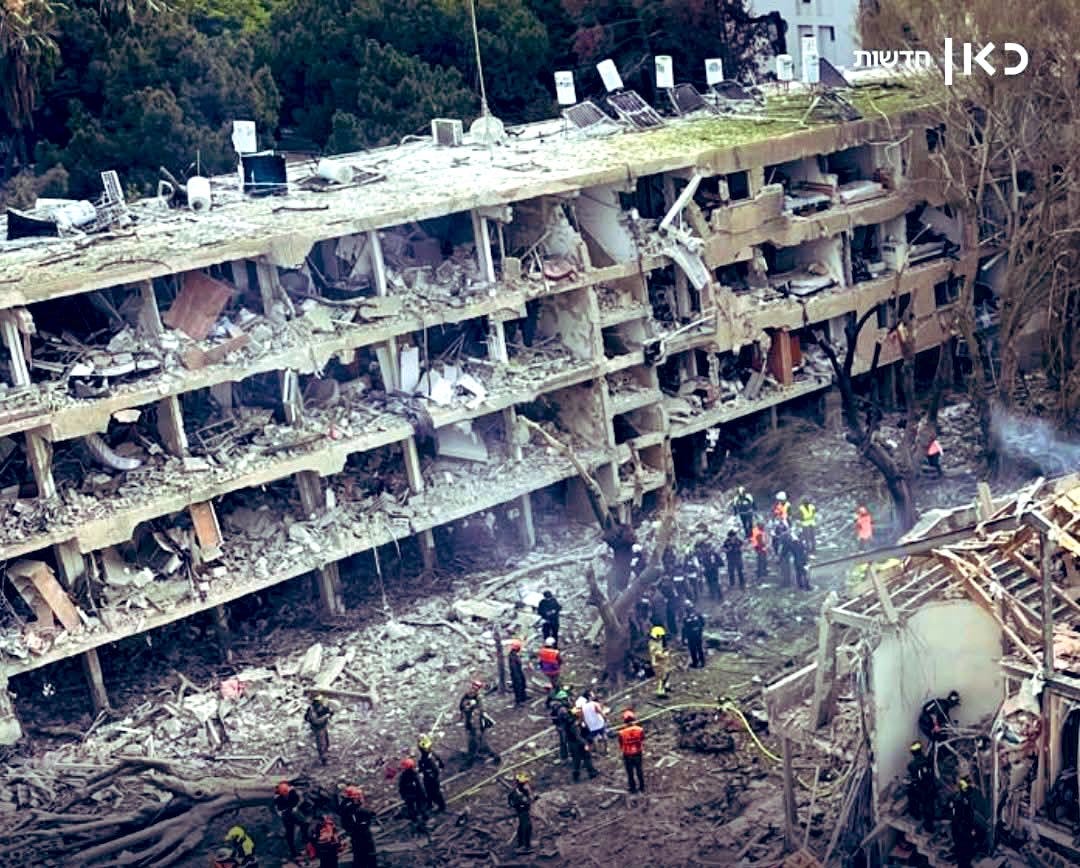Build Back Better or Push Out Faster?
How Israel’s “urban renewal” plan uses missile damage to justify state-led redevelopment, forcing families to give up homes they don’t fully own.
Under the banner of “build back better” after Iranian attacks, Israel is advancing a plan that could force citizens to sell their homes to the state if they reject urban renewal plans. Missile damage is being used as cover for a land grab. Here’s what’s really happening:

Finance Minister Smotrich and Interior Minister Arbel have unveiled an inter-ministerial task force to lead “urban renewal” in missile-hit areas. The language is hopeful. The agenda is not.
The task force includes the Ministries of Finance, Housing, Justice, Interior, Tax Authority, and the Israel Lands Authority. Read more here.
Officials openly speak of turning “destruction into opportunity.” The director of the Tax Authority, Shai Aharonovitch, supports a policy of preferring urban renewal over rebuilding the buildings destroyed by Iranian missiles. Aharonovitch is willing to relax the rules of the property tax fund and increase its expenses in order to enable the construction of new towers, instead of restoring old and low-rise buildings.
Aharonovitch does not hide that one of the reasons he supports urban renewal is to save money for the government. But for residents, that means pressure to give up their homes so the state can redesign entire neighborhoods from above. This is not voluntary. It’s managed, centralised planning.
“…There’s a preference for the demolition of damaged buildings.. in order to build new towers in their place, rather than trying to renovate the old and low-rise buildings. The argument of the proponents is that it makes no sense to renovate the damaged buildings, which do not have protection against earthquakes or safe rooms, and it certainly does not make sense to build new buildings of several floors, instead of dozens of floors.” Source:
As of today, 9,900 claims have been filed for missile-related damage. That’s nearly 10,000 Israeli families potentially facing state-led redevelopment, rezoning, and “offers” they may not be able to refuse.
We’ve seen this before. Under the banner of “improved infrastructure” and “public good,” entire communities are coerced into selling, relocating, or being zoned out of existence. Disaster becomes a development tool. Evacuees are real. The suffering is real. But the government’s solution isn’t relief—“We will build a better Israel,” they say. Better for whom?
This is how “build back better” works in practice:
Declare an emergency
Centralize control
Redesign what exists
Force compliance
Reward insiders
And once the land is gone—it’s not coming back. Residents won’t return to what they had—they’ll return to what the state decides they should have.
A war-time tragedy is being used to expand the reach of the state into private property and local life. Don’t let slogans like “urban renewal” and “resilience” distract from what this really is.
And the craziest part (almost) no one knows?
In Israel, most people don’t actually own the land their home sits on. Around 93% of the land is owned by the state and managed by the Israel Land Authority (ILA). When you “buy” a home, you’re typically leasing the land from the Israel Land Authority (ILA)—usually under long-term leases of 49 or 98 years. That means the state retains significant control over what happens to the land, including redevelopment plans, rezoning, or repossession under certain conditions.
(Source from ILA’s website: https://www.gov.il/he/departments/topics/ownership_and_registration/govil-landing-page)
This structure makes it much easier for state authorities to pursue urban renewal projects without the kind of legal resistance you'd expect in countries where private land ownership is more absolute.
To expand a bit more on this point: ownership or lease rights are recorded in the “Land Registry”, called “Tabu” in Hebrew, which is a legal record that documents ownership rights, leaseholds, mortgages, and other property-related matters. It's part of the Ministry of Justice, and it's where property rights are officially recorded. However, it is only the official registry, not the land itself. What’s registered in the Tabu could be full private ownership (rare), or more commonly, a long-term lease from the state, especially if the land is managed by the Israel Land Authority (ILA). So even when a person says, “I own this apartment,” it often means: “I own the structure and have lease rights to the land, as registered in the Tabu.”
Learn more about Agenda 2030 and how this scenario aligns well with its vision:
Unmasking Agenda 2030
Tune in to hear about Agenda 2030, Agenda 2050, Agenda 21, stablecoins, climate agenda, smart cities, 15 minute cities, surveillance, Bitcoin, fear, compliance, resistance & spirituality.
/End
This article was inspired by my Twitter/X thread here:
Please take a moment to like, subscribe, comment and share this article.
♥️ Efrat
Follow me:
Twitter | Telegram | YouTube | Instagram | My podcast | All other links
Sponsors:
►► Get your TREZOR wallet & accessories, with a 5% discount, using my code at checkout (get my discount code from the latest episode - yep, you’ll have to watch it)
Join me on these upcoming events:
Special offers:
►► 10% off on Augmented NAC: I arranged a 10% discount on the Augmented NAC from ZeroSpike, using the code: YCXKQDK2, and this link. (Please note, this is not medical advice and you should consult your MD)
►► Watch “New Totalitarian Order” conference with Prof. Mattias Desmet & Efrat - code EFRAT for 10% off
►► Get a second citizenship and a plan B to relocate to another country with Expat Money, leave your details for a follow up: https://expatmoney.com/efrat
— Support my work —
The best way to support me is by becoming a paying subscriber.
You can also “buy me a coffee” for a 1-time support, or with Bitcoin here.
Thank you!














I saw the notification that you had published this article and immediately read it. This is a disturbing situation. And I feel bad for all the people over there who can’t see what you see. When I got to the section about what “building back better” looks like in practice, and read your five bullets, I literally stopped reading for a bit. And in those bullets all I could see was Covid, climate change, and other “emergencies”. You nailed the script, and unfortunately it’s stunningly accurate. Thanks for continuing to share your observations and thoughts.
Don’t let a nice crisis go to waste. Government overlords have dreamed of “events” such as this for eons to further their agenda. They've all been a huge success thus far (yeah, right!!):
https://brownstone.org/articles/the-real-threat-of-15-minute-cities/
https://principia-scientific.com/15-minute-cities-complete-impoverishment-and-enslavement-of-all-the-people/
It’ll be great to build right into the new infrastructure: (nice of them to loosen the rules “for them” while tightening the rules for citizenry) as tall buildings of innocent citizenry will be much safer than shorter/more spread out buildings (??).
-Complete surveillance control
-Designs of a 15 minute dream city that perfectly supports CBDCs ("sorry Ms. Fenigson, you'll not be able to have the pizza you ordered tonight, as doing so will exceed your allowed carbon credits for the week (you know, cheese from cows & methane from cows and all that). Might we recommend the cricket and hummus falafel, just an 9 minute walk from where we see you are currently?".
-Complete compliance control (haven’t taken your latest booster yet?? Might explain why the door of your gov't provided housing will no longer unlock/let you in).
-The possibilities of totalitarianism are endless. 2025, welcome to 1984.
(even WEF has drawn up a nice little ditty you can read all about it:) https://www.weforum.org/stories/2022/03/15-minute-city-stickiness/